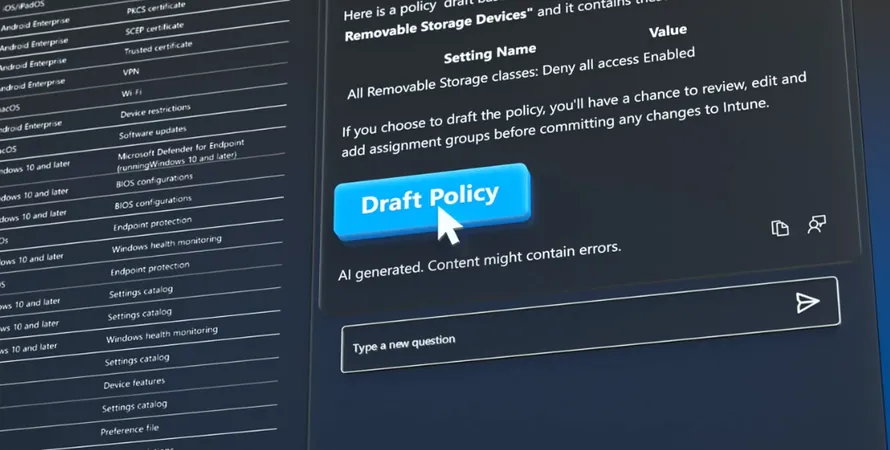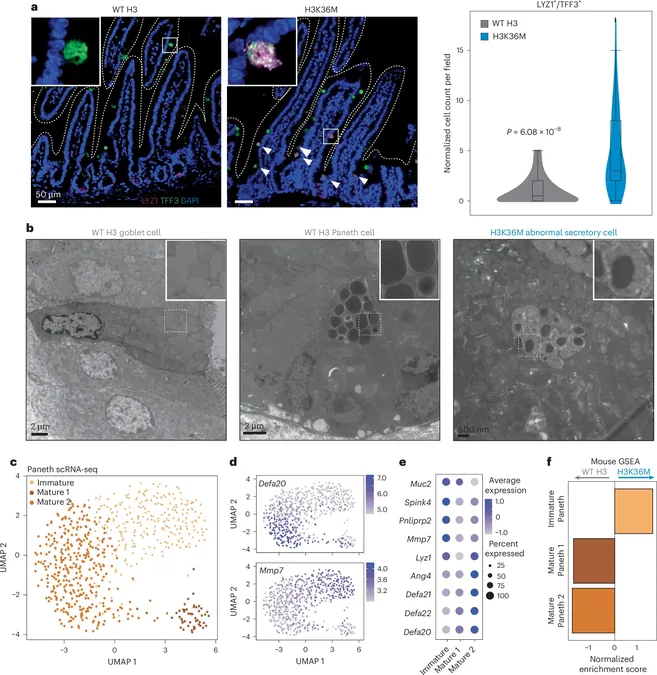
Microsoft Unveils Game-Changing AI Agents for Enhanced Cybersecurity with Security Copilot!
2025-03-24
Author: Arjun
Introduction
Microsoft Corp. is setting a new standard in cybersecurity by enhancing its Security Copilot service with groundbreaking artificial intelligence agents that automate tedious and repetitive tasks for users. This strategic move reinforces the company’s commitment to empowering cybersecurity professionals and enhancing overall security posture.
Launch of Security Copilot
Launched in April 2023, Security Copilot is a specialized tool that leverages Microsoft’s Copilot AI technology, enabling cybersecurity experts to quickly access and analyze crucial data relating to security breaches through simple, natural language prompts. This innovative service not only streamlines data handling but also automates essential tasks, such as configuring access controls for employee devices, thus saving valuable time for IT teams.
New AI Agents
The latest update introduces a suite of six internally developed AI agents, designed to extend Security Copilot's capabilities significantly. These enhancements will be complemented by an additional five partner-generated agents from renowned companies such as Aviatrix, OneTrust, Tanium, Fletch, and BlueVoyant.
Microsoft-Developed Tools
Among the new Microsoft-developed tools, three focus specifically on managing security alerts. The Phishing Triage Agent stands out, adeptly filtering out false positives from phishing alerts generated by a company’s cybersecurity systems. Furthermore, two additional agents concentrate on analyzing notifications from Microsoft Purview, a tool that withholds oversight when employees misuse sensitive business information.
The fourth agent, known as the Conditional Access Optimization Agent, works in tandem with Microsoft Entra—a vital tool for administrators governing employee application access. This agent identifies insecure access configurations and offers streamlined fixes that can be implemented with just a single click.
Another innovative addition, the Vulnerability Remediation Agent, integrates seamlessly with Microsoft Intune, a tool for managing Windows devices. This creates opportunities for administrators to identify vulnerable endpoints more swiftly and apply operating system updates promptly.
Finally, Microsoft has introduced the Threat Intelligence Briefing Agent, a feature that allows Security Copilot to generate comprehensive reports detailing potential cybersecurity threats that may jeopardize an organization's systems. Significantly, Microsoft's threat intelligence unit gathers an astonishing 84 trillion data points daily regarding online risks, including rising ransomware threats, underscoring the depth of insight provided by this agent.
Partner-Built Agents
The partner-built agents are designed to tackle additional use cases beyond the core functionalities. For example, Aviatrix's agent facilitates network troubleshooting, while OneTrust's agent assists businesses in adhering to privacy regulations seamlessly.
Empowering Security Teams
“Empowering security teams to have complete control, these agents enhance response times, prioritize risks, and bolster operational efficiency, ultimately enabling proactive protection and fortifying an organization’s security stance,” expressed Vasu Jakkal, Corporate Vice President of Microsoft Security, in a blog post unveiling the features.
Broader Cybersecurity Toolkit Enhancements
In conjunction with the rollout of these AI agents, Microsoft is enhancing its broader cybersecurity toolkit. Notably, Edge for Business—an enterprise-focused browser—now includes features that prevent employees from inputting sensitive data into chatbots, while similar controls will be established for desktop chatbot clients through integrations between Purview and third-party secure access service edge (SASE) solutions.
Additionally, Microsoft Defender for Cloud, essential for safeguarding cloud applications against cyber threats, is receiving substantial upgrades aimed at improving the detection of vulnerabilities in cloud-based AI workloads.
Conclusion
As organizations navigate the increasing complexity and frequency of cyber threats, Microsoft’s innovative developments in AI-driven cybersecurity are not just timely; they are essential for ensuring robust and proactive defenses in an ever-evolving digital landscape. Stay tuned for more updates as Microsoft continues to revolutionize the realm of cybersecurity!



 Brasil (PT)
Brasil (PT)
 Canada (EN)
Canada (EN)
 Chile (ES)
Chile (ES)
 Česko (CS)
Česko (CS)
 대한민국 (KO)
대한민국 (KO)
 España (ES)
España (ES)
 France (FR)
France (FR)
 Hong Kong (EN)
Hong Kong (EN)
 Italia (IT)
Italia (IT)
 日本 (JA)
日本 (JA)
 Magyarország (HU)
Magyarország (HU)
 Norge (NO)
Norge (NO)
 Polska (PL)
Polska (PL)
 Schweiz (DE)
Schweiz (DE)
 Singapore (EN)
Singapore (EN)
 Sverige (SV)
Sverige (SV)
 Suomi (FI)
Suomi (FI)
 Türkiye (TR)
Türkiye (TR)
 الإمارات العربية المتحدة (AR)
الإمارات العربية المتحدة (AR)